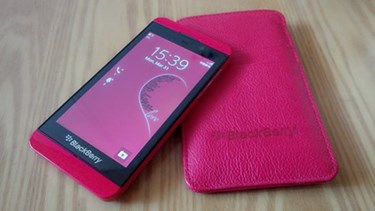Blackberry To Design Bacteria-Free Smartphone

Blackberry plans to give healthcare workers one less thing to worry about in the fight against hospital-acquired infections (HAIs) by designing a bacteria-free smartphone. In recent years, Blackberry has lost its foothold in the broader smartphone market, but many believe this move could re-establish the company in the healthcare sector.
The Centers for Disease Control and Prevention (CDC) estimate that patients in hospitals acquire 721,800 infections per year, and that HAIs resulted in 75,000 deaths in 2011. With growing concern over antibiotic-resistant super-bugs, hospitals everywhere are re-evaluating how to make an environment that is more sterile and safe for both patients and staff.
According to Blackberry CEO John Chen, smartphones carry an average of 25,000 germs per square inch. And 20 to 30 percent of germs transfer between phones and fingers, according to a study published in the Journal of Applied Microbiology and cited by Bloomberg,
With a bacteria-free phone, Chen said, “healthcare workers have to be worried about one less thing to wipe down.”
Chen made the comment during a recent keynote discussion at Mackenzie Richmond Hill Hospital in Toronto, where he and Altaf Stationwala, president and CEO of Mackenzie Health, sat down to discuss the various ways hospitals could improve patient experience by becoming more “smart.”
The bulk of Chen’s discussion concerned Blackberry’s new secure messaging and alerts system, a collaboration with ThoughtWire and Cisco, which seeks to test technology in a live environment with real doctors and nurses. That system is entering a pilot program at Mackenzie’s innovation unit.
In a company blog posting, Blackberry wrote that its goal was “to create a smart hospital environment where everyone can quickly see where the staff are within the unit, anticipate and respond to patient’s needs, and route information to the care providers that need it in a quick and efficient way.”
Though the bacteria-free Blackberry hasn’t yet been designed, it represents another way Blackberry is re-orienting its technology innovation toward the particular needs of healthcare workers.
Aviv Gladman, chief medical information officer at Mackenzie Health, told Bloomberg that transfer of bacteria between hospital workers and patients is a “huge issue.” Though hospital workers wipe down their phones with alcohol wipes, Gladman remarked that hectic schedules sometimes prevent strict adherence to that rule, and a bacteria-free surface would help.
William Schaffner, an infectious disease specialist at Vanderbilt University Medical Center, told ABC News that bacteria-free handsets for smartphones likely would not be the silver bullet that takes down HAIs, but he commented that the innovation would be “thoughtful and welcome.”
“Every little thing helps,” Schaffner said.
